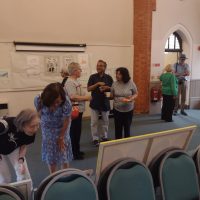Sermon given 5th March 2023 by Revd Sue McCoan
Genesis 12:1-4a
John 3:1-17
The call of Abraham, or Abram as he was then named, is a classic new beginning.
God calls him to go to a country he doesn’t know, and there God will bless him and
make of him a great nation. We often look at where he is going – it’s the land of
Canaan, the same place that will later be called ‘the Promised Land’. And we look at
what he takes with him – all his possessions, including livestock, his wife and
nephew and a whole household of servants. Abram is already a mature man, a man
of some wealth. We less often look at what he leaves behind.
God says, ‘Go from your country and your kindred and your father’s house’. He is
leaving Haran, where his father Terah had settled, and where Terah had died and
was buried. Abram has all his possessions with him, but he is cutting himself off from
his ancestry, from his family, and all that made him the person he is. It’s as if he has
to let go of his identity as part of that family, in order to embrace the new identity as
father of God’s great nation. He lets go of his past, in order to start his new future
with God.
That brings us to our second reading, from the gospel of John, of Nicodemus visiting
Jesus. There are some parallels between Nicodemus and Abram. Nicodemus, like
Abram, is a man of means with an established life. We don’t know about his personal
wealth, but we do know he was a Pharisee, and that role carried considerable social
status. He feels called to visit Jesus, which doesn’t involve much of a physical
journey, but it does mean crossing significant social boundaries. Most of the
Pharisees were at best suspicious of Jesus; at worst they were openly hostile or
secretly plotting his death. Nicodemus is breaking ranks in a big way – that’s why he
comes at night, so that the other Pharisees won’t see him and turn against him.
Nicodemus comes because he has seen something in Jesus – seen God at work.
No-one, he says, can do the signs you do apart from the presence of God. He’s very
respectful; as a Pharisee he would be educated to a high level but he addresses
Jesus as rabbi, teacher. I imagine that he is expecting Jesus to be pleased: that he,
as an important person, was treating Jesus as an equal; that he had recognized his
godliness and wanted to offer his support. I think he might have hoped Jesus would
welcome him as being ‘not like the others’.
But Jesus, as so often happens, confounds his expectations – no welcome, no
acceptance of solidarity, just what is quite a baffling answer. ‘No-one can see the
Kingdom of God unless he is born again.’ Or born ‘from above’. The Greek word
‘anothen’ can mean either of those.
We are familiar now with Christians who talk of being ‘born again’ but at the time of
Jesus, it was a very new idea. We can see that in the reaction of Nicodemus – he
doesn’t understand, and so takes Jesus literally, which is a fairly uncomfortable
image. Jesus uses this idea to convey to Nicodemus how radical his message is.
When a baby is in the womb, it has everything it needs: warmth, protection, nutrients
and oxygen. It is the perfect environment for a foetus to grow and develop. But it can
only develop so far. When the time comes, the baby is pushed out of this comfort
into a world of bright lights and harsh noises where it immediately has to breathe for
itself.
It’s a massive shock to the system. But once we are born, and over that initial shock,
then we can get to know the pleasure of being held, and fed; the delight of seeing
sunshine and colour, of music and dancing and friendships; the joy of love and the
dignity of trust. When we are born, we have a whole world to discover, and we can
explore and learn and grow.
Jesus is saying to Nicodemus: the kingdom of God is not an add-on, an extra
module to add to your already impressive academic qualifications. It is a whole new
experience; it means a whole new start. For Nicodemus, that would mean letting go
of his status and position as Pharisee and all that went with it. It seems like a lot to
lose. But, Jesus says, look what you gain: eternal life. Not life that goes on for ever
but life that has its fulfilment in God. Being born into God’s family, as God’s beloved
child, learning to live and grow in God’s grace.
We don’t know that Nicodemus was ever able to take this step. But we do know that
he was there at the crucifixion, and went with Joseph of Arimathea to bury the body
of Jesus. So he was well on the way.
Both of today’s readings are helpful when we come to contemplate new beginnings
in our own lives. Especially as we get older, we might find we have to make new
beginnings that are not entirely of our choosing, like redundancy, or retirement. We
might have to downsize to live somewhere more manageable; we might move to be
nearer relatives. And whatever the reason for our changes, we often find they involve
quite a bit of letting go – not just of material things but of friendships, of activities, of
places and memories that we cherish.
From Abraham, we learn about trusting God in our everyday life: about listening out
for God’s call, in small things as well as in major decisions. About God continuing to
lead us, even if we are not sure quite how things will turn out. We learn the need for
patience – Abram went on the strength of God’s promise, but it was 25 years before
that promise even began to be fulfilled, in the birth of Isaac. Above all we learn that
God has our best interests at heart, for ourselves, our families and our communities,
so we can go forward in confidence and faith, wherever we are called.
And from the conversation between Jesus and Nicodemus, we learn about trusting
God with our spiritual lives. Most of us here already count ourselves Christians; we
have made a commitment to Jesus, maybe at a specific moment, maybe gradually
over the years. So we are not looking for a whole new re-birth. But every day, there
is an opportunity for new beginning, for letting go of our pride, or our mistakes, or our
regrets; for letting go of a little bit more of our independence from God, for admitting
that we still have so much to learn, and for opening ourselves once again to new
growth, to new life, to the grace and blessing of eternal life in God.
Let me end with a prayer by Julian Sanders from the 2020 URC Prayer Handbook.
Lord, you called Abraham to leave
The safety and security of his homeland
And journey somewhere new with you.
In that very act of faith, Abraham was rewarded,
Becoming the heir of the world.
You call me too, Lord,
To leave behind things I may find familiar and comforting
And journey to a new place with you.
Grant me the courage
To go when you call,
And to continue journeying
Until I reach the land you will show to me.
Amen.




